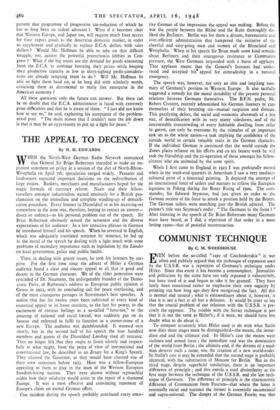THE APPEAL TO DECENCY
By W. H. EDWARDS
WHEN the North-West German Radio Network announced that General Sir Brian Robertson intended to make an im- portant statement on policy it a session of the diet of North-Rhine- Westphalia on April 7th, speculation ranged widely. Peasants and landowners expected important decisions' on the redistribution of large estates. Bankers, merchants and manufacturers hoped for the magic formula of currency reform. Nazis and their fellow- travellers amongst industrialists waited anxiously for a British pro- clamation on the immediate and complete winding-up of denazifi- cation procedure. Every listener in DUsseldorf or at his receiving-set somewhere in the zone was, therefore, hoping to extract an answer— direct or indirect—to his personal problem out of the speech. Sir Brian Robertson obviously sensed the tenseness and the diverse expectations of his audience. In a few attractive phrases in German he introduced himself and his speech. When he reverted to English, which was adequately translated sentence by sentence, he led up to the moral of the speech by dealing with a light touch with some problems of secondary importance such as legislation by the Lander on local government, police and public health.
Then, in dealing with graver issues, he took his listeners by sur- prise. For the first time since the advent of Hitler a German audience heard a clear and sincere appeal to all that is good and decent in the German character. We of the older generation were reminded of Dr. Naumann, the unforgettable founder of the Demo- cratic Party, of Rathenau's address to European public opinion at Genoa in 1922, with its concluding call for peace everlasting, and of the most courageous passages in Stresemann's best speeches. A nation that has for twelve years been subjected to every kind of oratorical appeal to its baser instincts, to the lust for power, to the excitement of envious feelings as a so-called "have-not," to the arousing of national and racial hatred, was suddenly put on its honour and exhorted to fulfil its function as a corner-stone of a new Europe. The audience was dumbfounded. It warmed very slowly, but in the second half of his speech the four hundred members and guests of the Dusseldorf Landtag shed all restraint. They no longer felt that they ought to listen silently and respect- fully to what might, from the point of view of international and constitutional law, be described as an Ersatz for a King's Speech. They cheered the Governor, as they would have cheered one of their own statesmen before x933. Here was a fellow-European appealing to them to play in the team of the Western European freedom-loving nations. They were shown without reproachful asides how their solidarity would assist in the repair of a shattered 'Europe. It was a most effective and convincing statement of Europe's claim on united German effort.
One incident during the speech probably convinced every atten-
live German of the impression the appeal was making. Before the war the people between the Rhine and the Ruhr thoroughly dis- liked the Berliners. Berlin was for them a distant, bureaucratic and over-efficient administration that hampered the initiative of the cheerful and easy-going men and women of the Rhineland and Westphalia. When in his speech Sir Brian made some kind remarks about Berliners and their courageous resistance to Communist pressure, the West Germans responded with a burst of applause. That applause meant that the General's listeners had under- stood and accepted his. appeal for comradeship in a national emergency.
The speech was, however, not only an able and inspiring sum- mary of Germany's position in Western Europe. It also tactfully suggested a remedy for the moral instability of the present personal relations between Germans themselves. The B.F.N. padre, Mr. Robert Crossett, recently admonished his German listeners to cure themselves of their besetting sin—mutual suspicion and distrust. This paralysing defect, the social and economic aftermath of a lost war, of denazification with its very seamy sideshows, and of the interminable overcrowding of every habitable dwelling from cellar to garret, can only be overcome by the stimulus' of an important task set to the whole nation—a task implying the confidence of the outside world in certain, valuable traits in the German character. If the individual German is convinced that the world outside the Zones places reliance on his efforts and on his honest work he will seek the friendship and the co-operation of those amongst his fellow- citizens who. are animated by the same spirit.
When I first came to England in x923 I was profoundly moved when in my week-end quarters in Amersharn I saw a very mediocre coloured print of a historical painting. It depicted the attempt of an international force of sailors and marines to relieve the European legations in Peking during the Boxer Rising of x9oo. The com- mander, Sir Edward Seymour, had just given an order to the - German section of his force to attack a position held by the BOXCIS.
The German sailors were marching past the British admiral. The painter's title was Seymour's order : " The Germans to the front I " After listening to the speech of Sir Brian Robertson many Germans must have heard, as I did, a repetition of that order in a more lasting cause—that of peaCeful reconstruction.






























 Previous page
Previous page